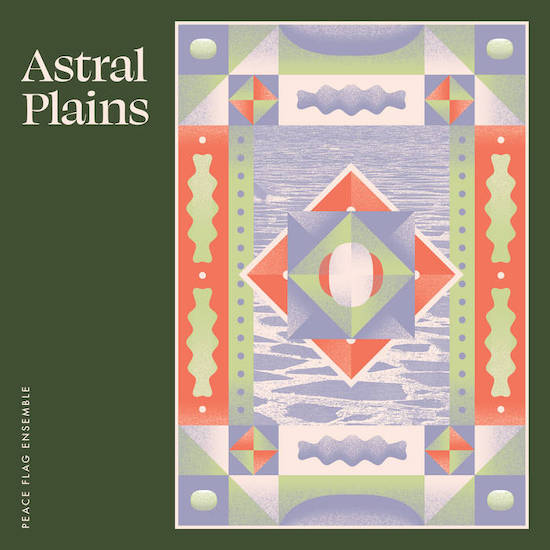I spent some time in Saskatchewan when I was a kid. Not a lot, just a few days on a pre-teen family road trip, but it was enough that images of the wide open spaces, grasslands and endless Nodding Donkeys – the oil pumps that pepper the landscape – are forever burned into my memory.
Thoughts of that time and that place are evoked by Astral Plains, the second album from Peace Flag Ensemble. Of course, that’s an entirely personal thing, specific to myself and in part triggered by knowing that the core members of the Canadian jazz collective all hail from that state. Still, the album title and the overwhelming sense of pastoral calm conjured across these twelve tracks implies a conscious rooting of the music in the landscape it was created in.
‘The Work’ opens proceedings on a moment of early morning reflection. Paul Gutheil’s saxophone meanders around Jon Neher’s similarly sleepy piano, while subtle ambient effects – one of the album’s hallmarks – eventually give way to a dawn chorus of birdsong.
Despite the album’s (almost) wordless nature, ‘Agnes Martin Dreams of Macklin’ is directly set in Saskatchewan, its title a reference to the local artist whose minimalist paintings conjured vast expanses of space – abstract plains, if you will – with simple blocks of acrylic paint and pencil lines. You detect an affinity between the group and the artist. Although this album sees them broaden their sonic palette with an expanded line-up, these compositions still make a feature of their often sparse nature.
Elsewhere, ‘Waiting Is My Favourite Colour’ and ‘Shamble On’ recall the home-spun pastoralia of Scottish multi-instrumentalist (and secret Idlewild bassist) Andrew Wasylyk. On the latter, electric bass, buried deep in the background, gives way to drums from new recruit, percussionist Michael Thievin. It’s hardly frenetic, but this sudden shift into a groove is a striking departure from the group’s drum-free debut album, Noteland.
The second half of the record breaks up the stillness further. ‘Bluets’ is pensive, foregrounding Neher’s piano and Travis Packer’s bass, while Michael Scott Dawson (who mixed and produced the album) fills in the gaps with subtle electronic flourishes and tape manipulation. ‘Natural Amble’ grows more dissonant and strange as it continues, while still capturing a moment of rural beauty. It feels like it’s been designed to play over a National Film Board of Canada documentary. Best of all is the brooding ‘Burner Phone’, which hums with film noir paranoia. It’s not the first moment on the record that recalls Angelo Badalamenti.
This is, for the most part, a highly accessible album. The tracks are short and self-contained and, although based on improvisation, they have a strong sense of form and structure. The only exception to this is ‘Love Notes (For Eli)’, a startling percussive interlude. It starts and stops suddenly before giving way to the more luxuriant tones of ‘Too Beautiful For A Cubicle’, an atmospheric cut redolent of modern day library music maestro, Frank Maston.
While the track title ‘More Bill Joy Than John Wisdom’ – seemingly a reference to Joy’s essay ‘Why The Future Doesn’t Need Us’, which expressed misgivings at the consequences of rapidly changing technology – might suggest that the Ensemble are a bunch of rural refuseniks, this is forward-thinking music, blending improv jazz with ambient electronics to impressive and atmospheric effect. Astral Plains may be set amid the golden fields of Saskatchewan, but Peace Flag Ensemble have their eyes on the stars.


